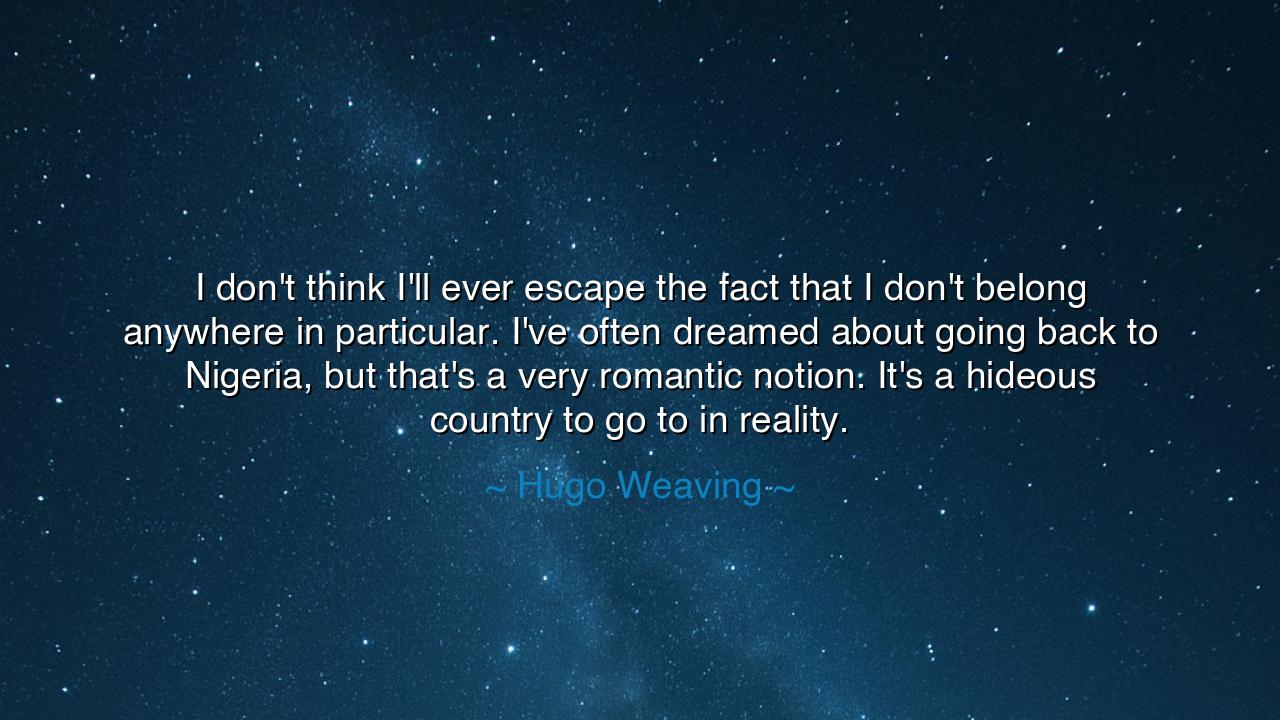
I don't think I'll ever escape the fact that I don't belong
I don't think I'll ever escape the fact that I don't belong anywhere in particular. I've often dreamed about going back to Nigeria, but that's a very romantic notion. It's a hideous country to go to in reality.






Hear the voice of Hugo Weaving, who spoke with a restless heart: “I don’t think I’ll ever escape the fact that I don’t belong anywhere in particular. I’ve often dreamed about going back to Nigeria, but that’s a very romantic notion. It’s a hideous country to go to in reality.” In these words we find the cry of exile, the lament of one who carries fragments of many places but feels at home in none. They are the words of one who has known the pull of memory, the sweetness of nostalgia, and the bitter truth that the world as it is seldom matches the dream we hold of it.
The yearning to belong is one of the oldest hungers of humanity. From the wandering tribes of Abraham to the scattered children of diaspora across centuries, people have always longed for a place to call home, a soil that whispers back their own name. Weaving admits that he is a man without such an anchor, a traveler not by choice but by circumstance. His longing for Nigeria, where he was born, is not for the country as it stands today but for the dream it represents—his own lost innocence, his beginnings, a vision more romantic than real.
This divide between the romantic notion and the reality is a universal experience. Many who have left their homelands return to find that the land they dreamed of no longer exists. Time has changed it; memory has polished it into a jewel brighter than it ever truly was. The streets are not as they remembered, the people are strangers, the customs have shifted. What they sought was not a place but a memory, and memory cannot be returned to. As Heraclitus once said: “No man ever steps in the same river twice.” So too, one cannot return to the land of their childhood unchanged.
History offers countless echoes of this truth. Consider the fate of Ovid, the Roman poet exiled to Tomis on the Black Sea. He longed desperately for Rome, for the city of his youth, but his letters reveal a tormenting truth: even if he returned, the Rome he dreamed of no longer existed. The romantic notion of home was stronger than the city itself. Or think of the children of the Jewish diaspora, who for centuries said, “Next year in Jerusalem.” When many finally returned, they discovered a land both holy and harsh, filled with promise but also strife. In every age, the romantic longing for home has been pierced by the harshness of reality.
Weaving’s words also unveil a deeper, painful honesty: that sometimes the land of our birth is not a place of safety or beauty, but of struggle. To speak of Nigeria as “hideous” is not to scorn its people or history, but to acknowledge the instability, corruption, and hardship that mark it in his eyes. For those who have left such places, the heart is torn in two—part of it clings to the romantic dream, part of it fears the reality that greets them should they return. This is the exile’s burden: to belong nowhere fully, to always carry both hope and disillusionment.
The lesson here is not despair but wisdom. We must recognize that home is not always a place; sometimes it is the people we love, the memories we carry, or the identity we forge along the way. To cling too tightly to the romantic notion of a perfect homeland is to risk disappointment. Yet to deny the longing entirely is to deny part of our humanity. The wise soul learns to walk with both—the dream of home and the acceptance of reality—knowing that belonging may be found not in geography but in connection, not in the soil beneath our feet but in the bonds we weave with others.
Therefore, children of tomorrow, take this teaching: love the places of your past, but do not imprison yourself in their illusions. Know that longing is part of the human heart, but so too is the power to create new belonging wherever you stand. Honor your memories, but plant new roots, for even the wanderer may find home in the loyalty of friends, in the love of family, in the work of the hands and heart.
Thus Hugo Weaving’s words, though touched with sorrow, shine with eternal counsel: the romantic notion of return may never match the truth, but the spirit of belonging can still be forged, not in the lands we dream of, but in the lives we choose to live today.






AAdministratorAdministrator
Welcome, honored guests. Please leave a comment, we will respond soon